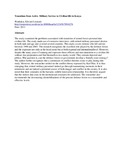| dc.description.abstract | The study examined the problems associated with transition of armed forces personal into civilian life. The study made use of extensive interviews with retired military personnel diverse in both rank and age and covered several counties. This study covers retirees who left service between 1990 and 2003. The research recognises the excellent role played by the defence forces and the exposure not only at the local scene but at both regional and intemationallevel. However, despite the many years of training and exposure these officers and men transition to a civilian life without due preparation and find themselves in a murky world. They remain dejected and jobless. The question is, can the defence forces or government develop a friendly exist strategy?
The author further recognizes that a continuum of conflict theories come to play during this study. However, the researcher settled on the conflict theory espoused by Karl Max. It is thus emerging that, retired military personnel indeed go through traumatising moments in their retirement and are indeed a potential source of both danger and conflict in the society. It is also noted that their comrades in the barracks exhibit lukewarm relationship. It is therefore argued that the defects that exist in the institutional structures be addressed. The researcher also recommends the downsizing (demobilisation) of the present defence forces to a reasonable and effective levels. | en_US |

